How To Become A Certified Instructor Or Coach
Why Become Certified?Click here! |
Obtaining a certificate is an important life-time achievement. As a certified EC/NCCP Coach or Instructor, clients, students, and parents will know that you have achieved the highest standards in Canada for equestrian coaching, adhere to best-practices, have training in safety, first aid, & safe sport, and are screened and insured. |
|
Announcing the NBEA's Coaching Handbook and Resources (C.H.A.R.)
|
VIDEO - Webinar with Danielle YaghdjianMaster Coach DeveloperPickering, Ontario
|
PowerPoint Presentation |
Step-by-Step:
Step 1: Get your membershipsA. NBEA MembershipB. Equestrian Canada Sport LicenceAn EC Bronze sport license is sufficient for candidates, unless you plan to compete at the Silver or Gold level.
|
||||||||
Step 2: Contact the NBEA.To start the certification process, contact the NBEA for Instructor or Competition Coach certification, and also Equestrian Canada for Competition Coach Specialist or High Performance certification. You do need to formally apply, but before you do so, you should declare your interest and get your name on contact lists for courses and evaluations. Sometimes courses and evaluations are scheduled in advance, and sometimes they are scheduled when there are sufficient numbers of participants. If you are not certain about which certification is right for you, the coaching coordinators at the NBEA are happy to assist you.
NBEA Provincial Manager of English Coaching: Nicole BeaulieuNBEA Provincial Manager of Western Coaching: Cyndy Toner
|
||||||||
Step 3: Open a coaching file with the Coaching Association of Canada
Open an account in "The Locker" at the CAC website. As you submit the proofs of your prerequisites or attend sanctioned training, the information will be stored in your file in . Your provincial manager of coaching can help you. You can set up a Locker account before you have your prerequisites or you're certified. Anyone can set up an account and take training available.
|
||||||||
Step 4: Acquire prerequisites, including supporting documents & courses.
♦ Basic Prerequisites for all coaching programs:
♦ As you get started toward your certification, you must have:
A. Standard two-day First Aid training certificate issued by an organization licensed for the delivery of First Aid Training in Canada ♦ First Aid training providers ♦ St.John Ambulance calendar Both the NBEA and EC require a 2-day certification, either as a 2-day in-person course or a blended option with 1 day online. EC does not recognize online-only First Aid Level C certification.
B. Criminal Record Check, including Vulnerable Sector for anyone born before 1986. This is free to EC Sport Licence holders*.♦ Enhanced Police Information Check (E-PIC) ♦ E-PIC Matrix ♦ E-PIC Information Sheet ♦ Sterling Backcheck - Global Background Screening Partner for Equestrian Canada ♦ Vulnerable Sector Check Form
C. Safe Sport Training - one of the following: ♦ Fostering Healthy Equestrian Environments - ECampus required for EC sport licence-holders* ♦ Canada Safe Sport Training - CAC Locker
D. Concussion Training - one of the following: ♦ Concussion Awareness - ECampus required for EC sport licence-holders* ♦ NCCP Making Head Way in Sport - CAC Locker
E. Signed Equestrian Coaching Code of Conduct and the EC Code of Ethics. Submit to your provinicial manager of coaching.
F. Making Ethical Decisions - NCCP Locker. The evaluation is compulsory; the training available before the test is optional.
♦♦♦ Optional Courses and TrainingEC Coaches are encouraged to attend other multi-sport training to improve their coaching toolset
|
||||||||
Step 5:
|
||||||||
Step 6: Train and prepare.
♦ Prep Clinics: Watch the Coaching News page for coaching preparation activities. The NBEA Calendar also maintains a listing of these events.
♦ Mentor: It is strongly recommended that you attend training and book some sessions with a qualified Mentor who can help you prepare for the coaching evaluation requirements. Your administrator will be able to give you names of trained Mentors in your area who would be able to assess your teaching or coaching style and help you prepare for evaluation. You can continue to be coached by your own coach; however, only coaches that have taken training to familiarize themselves with the evaluations or who have been evaluated themselves are in a position to provide information and feedback that is accurate regarding the expectations you face.
♦ Study: • Check out the Coaching Resources page for materials to help prepare.• Training modules available on the Equestrian Canada ECampus, found in your "My EC" profile.
You can also contact your coaching manager for a name of a Learning Facilitator in the NCCP program who you could hire to mentor or tutor you on writing your lesson and training plans.
♦ Lesson Plan: Lists of possible lesson topics for English and western are available. As practice, why not write lessons plans for each topic on the list well ahead of time? You can have your mentor look them over, and you can use them in your practice teaching sessions with your mentor. You will then have prepared written plans available when your topics are assigned for your evaluation portfolio by your evaluator - see below.
* The NBEA dedicates funds and resources to help support candidates with mentoring. Online webinars, videos, and other learning tools are also available. Stay tuned to the Coaching News web page.
|
||||||||
|
Step 6: Apply for evaluation.Once all your prerequisites are obtained, and your application has been received by your manager of coaching, they will set up your evaluation by trained and certified Evaluators. They will also send you candidate information packages to help you prepare. The basic evaluation process for each certification type is listed here. You will be evaluated on your Portfolio and through an Observation Evaluation. Portfolio Western One written lesson plan focused on a topic that is assigned to you by NBEA Emergency Action Plan for their primary facility. English One written lesson plan focused on a flat topic that is assigned to you by NBEA One lesson plan focused on a jump topic that is assigned to you by NBEA (if applicable) Emergency Action Plan for their primary facility. Topics are assigned a minimum of two weeks before the evaluation. Candidates have one week to submit completed lesson plans to the evaluator for feedback.
Observable Evaluation
Only evaluations which are authorized by Equestrian Canada will qualify you to obtain Equestrian Canada/NCCP certification. When you successfully complete evaluations, the results are sent in to Equestrian Canada. If you have your Registered Coach status, EC will authorize certification, update the EC database, and advise the Coaching Association of Canada (CAC) so that they can update your professional coaching transcript in their national database. Your certificate will be mailed to you within a few weeks of your certification confirmation by Equestrian Canada. Your NBEA Coaching Certification Incentive funding cheque will be included. If you were evaluated in a program administered by the NBEA, the provincial Manager of Coaching will forward all required paperwork from your evaluation results to Equestrian Canada for certification.
|
||||||||
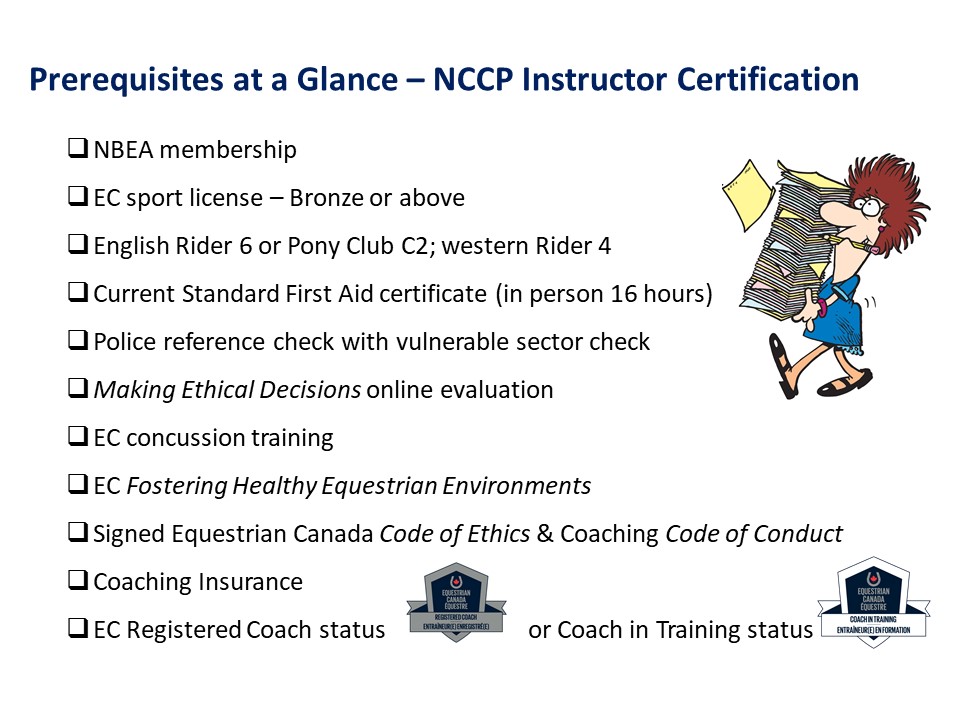
|
â–º Demystifying the EC NCCP Coaching Certification Pathway - Webinarâ–º Demystifying the EC NCCP Coaching Certification Pathway - Q & A |
|
|
$500.00 GrantObtaining your Coaching Certification is an important life-time achievement. As a certified NCCP/Equestrian Canada Instructor or Coach, your clients and students will know that you have achieved the highest standards in Canada for equestrian coaching, and adhere to best-practices in coaching. The NBEA would like to recognize the time, hard work, and dedication that go into achieving this goal, by offering a $500 grant to up to 10 applicants, upon successful completion of their Instructor of Beginners or Coach certification. Once you have successfully completed your certification assessment and have all your components up-to-date, your Coaching Coordinator will notify the NBEA office to issue your $500 grant. |
|
♦ Instructor Evaluation Rubric♦ Instructor Jump Evaluation Rubric♦ English Competition Coach Evaluation Rubric
|

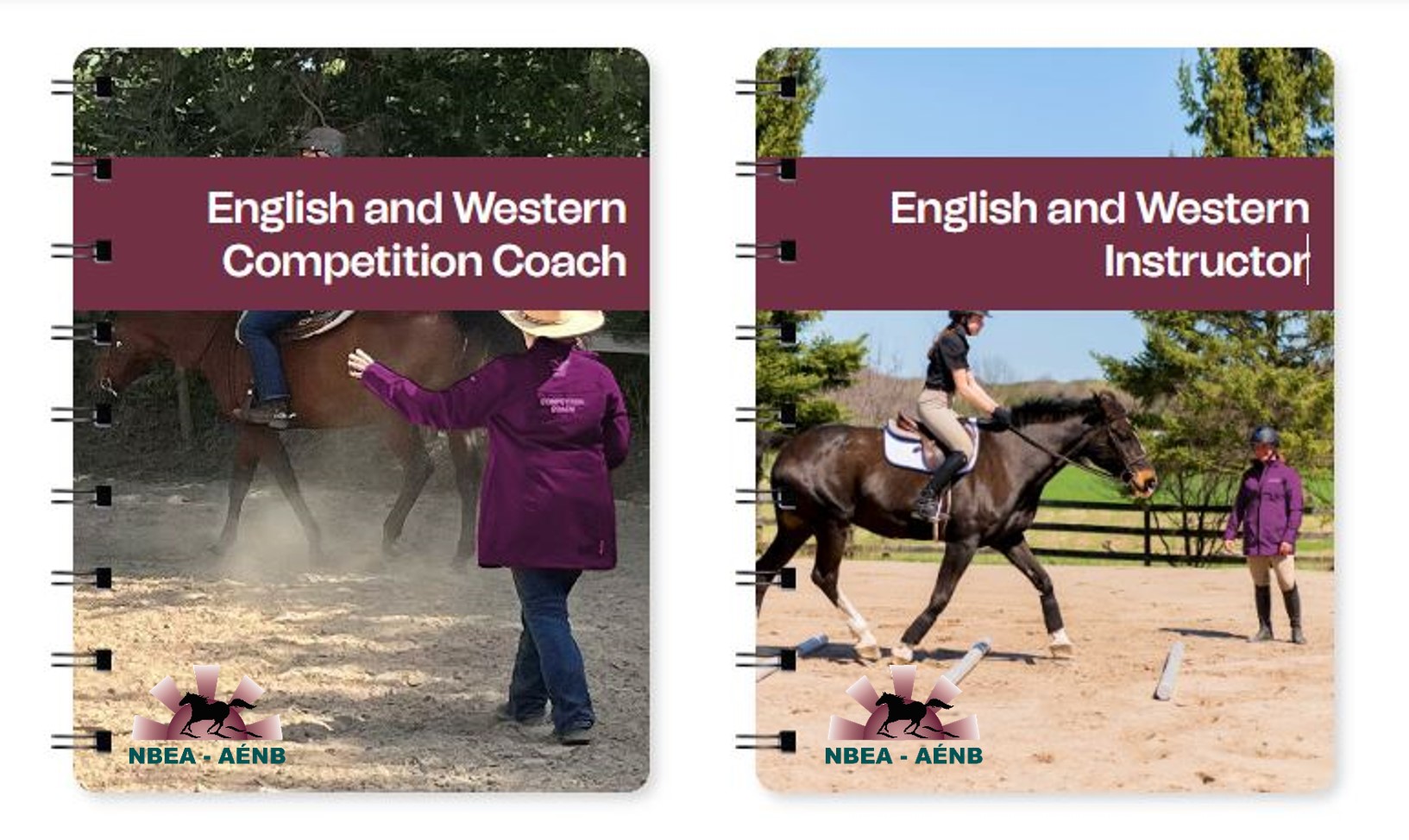
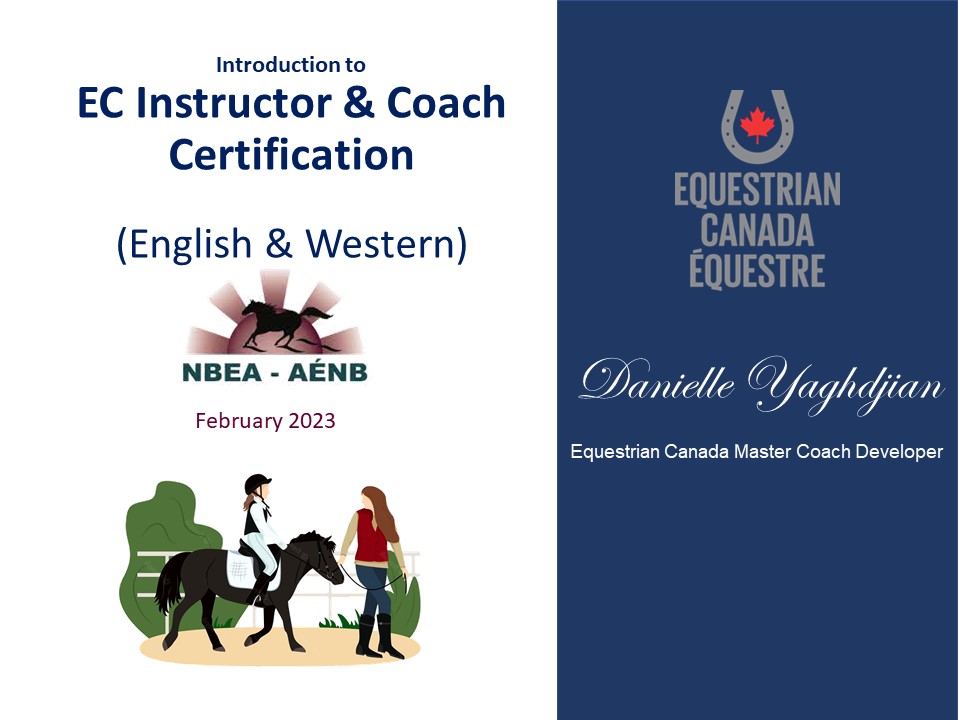
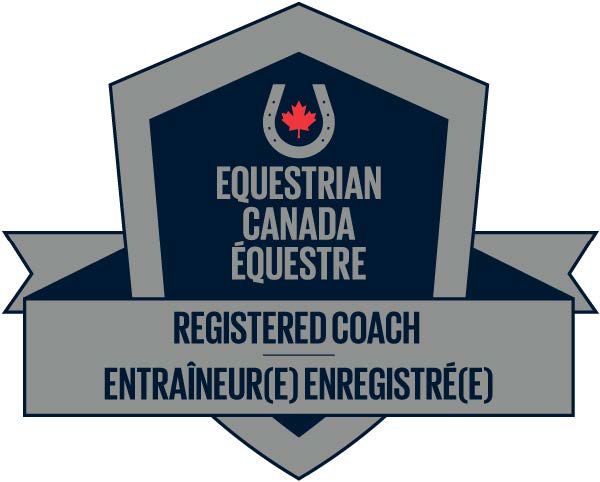
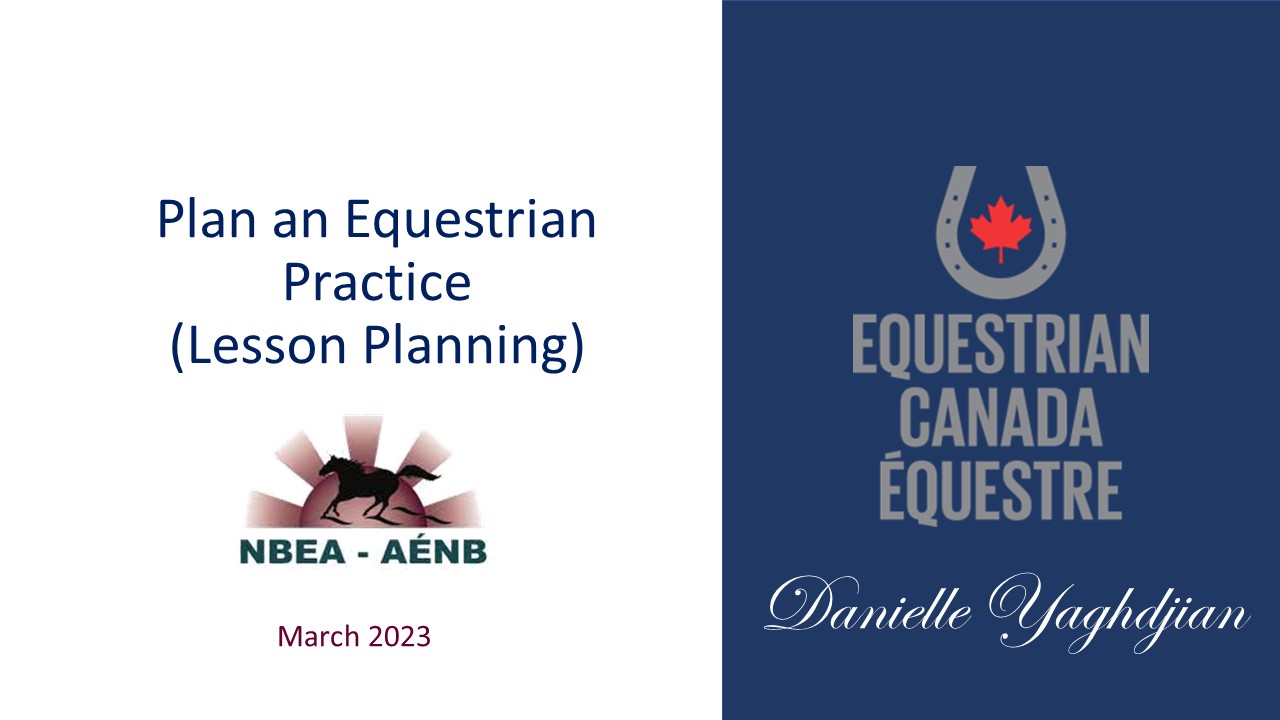




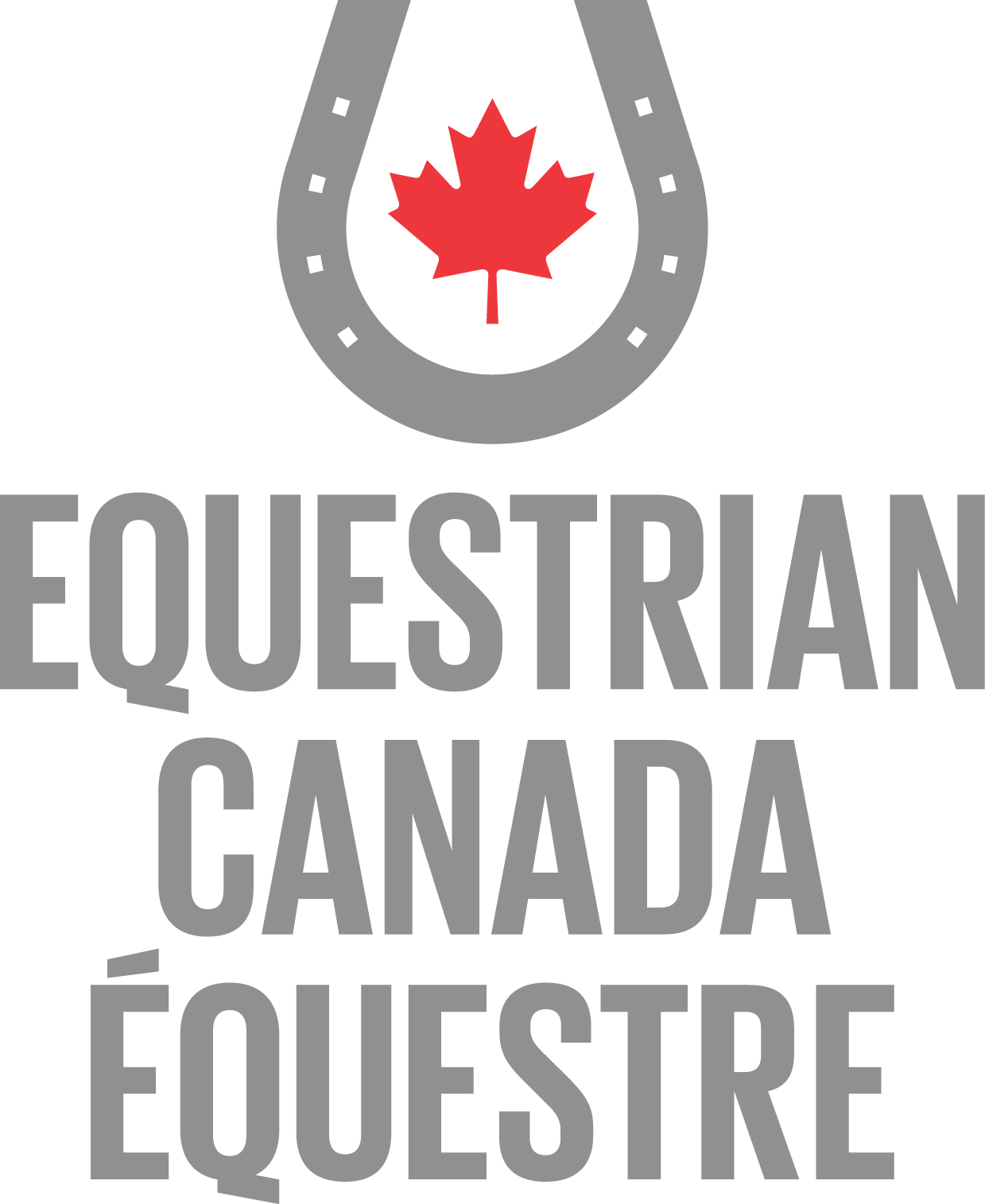
.png)
